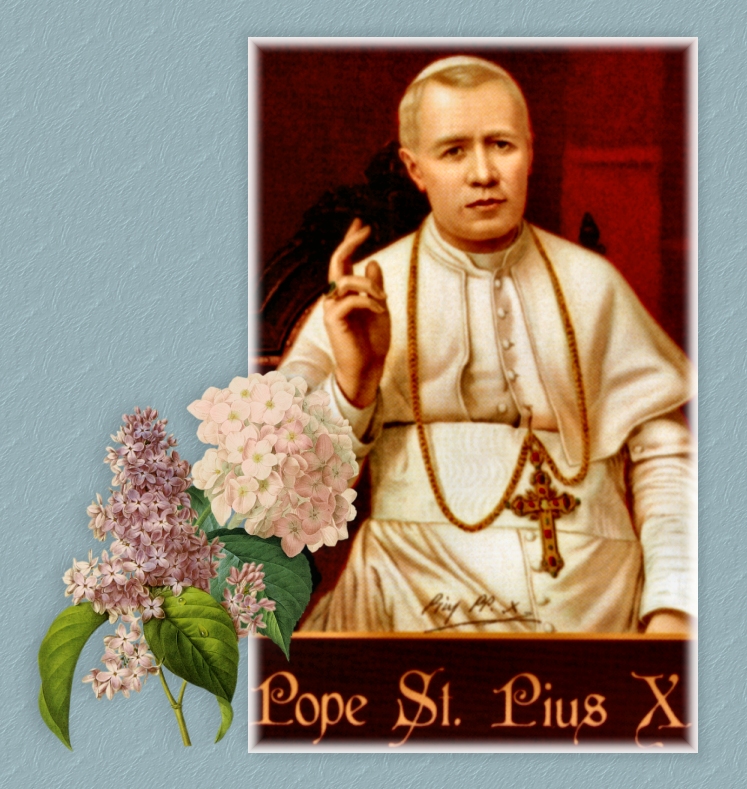

Mothers: the Most Important Persons
1. The Most Important Person2. The Mothers of Priests
3. Prayer for Vocations by Ven. Pope Pius XII
4. Print a Prayer Card for Vocations
5. By a Mother of a Priest
The most important person on earth is a mother. She cannot claim the honor of having built Notre Dame Cathedral. She need not. She has built something more magnificent than any cathedral------a dwelling for an immortal soul, the tiny perfection of her baby's body.
"The Angels have not been blessed with a such a grace. They cannot share in God's Creative miracle to bring new Saints to Heaven. Only a human mother can. Mothers are closer to God the Creator than any other creatures. God joins forces with mothers in performing this act of creation."
"What on God's good earth is more glorious than this: to be a mother?"
------Joseph Cardinal Mindszenty
"A vocation comes from the heart of God, but goes through the heart of the mother."
------St.
Pope Pius X
The Priestly Mother
Taken From MOTHERS OF
PRIESTS, Fr. Robert Quardt,
SCJ, Angelus Press,
Nihil Obstat, Imprimatur and Imprimi
Potest,
1956.
To order the book about $9.00, for
all the true
stories, call 1-800-966-7337.
Note: The images on this page do
not come with the book.
Today there is a burning question regarding the recruitment of vocations to the priesthood. Much has been said, written, and done in this regard, and with it all there has been too little thinking about the role of mothers with whom, next to God, the almost radical solution lies. If God in His omnipotence can make bread from stones, can call His priests from the most troubled circumstances, though this is at any rate the exception, it proves the rule, that the great majority of all priests owe their vocations not to clever recruitment schemes, but to a good mother or grandmother. The question of priestly recruits is largely a question of the mother, the priestly mother, who transmits the priestly spirit to her sons.
Such a mother places her heartfelt wish before God, praying often and fervently. What the prayer of the mother is capable of doing is demonstrated by the following true stories, but two from among a number:
Somewhere in northern Italy is a rural area containing the town of Lu with about four thousand residents. Families with six to ten children are the rule.
In 1881, the mothers of the families of Lu began coming together on the First Sunday of each month to assist at Holy Mass and to receive Holy Communion. What the women brought about by these spiritual exercises is expressed very beautifully in the prayer which they recited together at this Mass. The prayer reads:
O God, grant that one of my sons becomes a priest! I promise to live as a good Christian woman and will lead my children to all that is good, wherewith I hope to receive the grace to be able to give to Thee, O God, a holy priest.
So have the women of Lu prayed all these years since 1881. The prayer was short yet so powerful that a flood of priestly vocations were bestowed upon the town. In fifty years, the prayers of these mothers have won at least five hundred priestly and religious vocations from out of the relatively small village. But, remember, it was only in the town of Lu that for those fifty years, the good women were assisting together at the First Sunday Mass specifically for the intention of religious vocations!
Happy, blessed Lu! The prayers of a mother are indeed powerful when they are intended to beg heaven for priestly vocations. It almost seems that God waits upon mothers for their prayers, and then vocations bloom like flowers in May!
-------------------------------------
The chaplain of a prison stumbled into the cell of a convict. The prisoner drew the attention of the priest to the graffiti sign which he himself had scrawled and which hung on the whitewashed wall. The sign read: "Mothers are the Fate of Men." [Duly noted exception noted below.]
"You see, Father," said the convict, "in prison one has time to think about a lot of things, and the result of my reflection is this small saying: 'Mothers are the Fate of Men.' A good mother is a blessing for the children; a bad mother, however, is a terrible curse."
The man said no more, and the priest tactfully did not inquire further.
Why is this event related here even though it may sound out of place? For the very reason that in the mirror of contrast, truth becomes much more bright and certain.
Mothers are the fate of men and, we must say, the fate of priests.
Vorst is a great market town in the vicinity of the Rhine city of Krefeld, West Germany. A hundred and forty years ago, an eighteen-year-old girl was taken sick there in a very bad way. Already near to death, the dying girl made the vow that if she was given the grace to overcome the illness and later to be married, she would consecrate her firstborn child to the exclusive service of God.
The fraulein recovered and seven years later she married. During those seven years, Frau Neuenhofen, as she was called after her marriage, never forgot her promise. At the moment she knew that God had blessed her with a child, she offered it as Mary herself would have done while the Divine Child slept in the holy cradle beneath her heart. Frau Neuenhofen renewed her offering every day. Her first child was to be a boy, and some say in retrospect that it appeared the child was already given a miraculous predisposition to the priesthood while in the sanctuary of his mother's womb. Already early on his priestly vocation was known to him, and his mother prudently guarded him carefully from every harmful influence. In Steyl [1885], he received the holy priesthood.
On the evening of the day of his First Mass, the happy mother walked with her son through the garden. On this occasion, Frau Neuenhofen spoke for the first time of her promise, which she had carried silently in her heart all these years, and she ended the conversation with these words: "God is good. You are now a priest. This morning I received from your hand the Body of Christ. Soon, your brother John will be ordained as well, and, if all is as it seems, our youngest will eventually become a priest."
Thus spoke so confidently the priestly woman, and it later came to pass. I say "priestly woman," because she had the zeal for souls which characterizes priests. Three sons of Frau Neuenhofen became priests. The eldest was a spiritual director and teacher to priests and future priests. Among his many students were three missionary bishops. What blessings came forth from this mother with the priestly heart for the salvation of souls, and, by extension, from the sons she gave to the holy priesthood of her Lord Jesus Christ!
"Mothers are the fate of men." We have to admit this statement does not always hold true. The writer of these lines remembers his visit to a prison camp during World War II. A convict who had spent sixteen of his forty-eight years behind bars once said to me in a remorseful tone: "You know, Fr. Robert, I come from a good family. My mother goes to Mass every day. All of my brothers and sisters are upright and highly regarded. I alone am the black sheep at home, the greatest sorrow of my old mother."
Not always are mothers the fate of men, but the decision about the priesthood of one or more of her sons most always lies with the mother.
How did the holy Pope Pius X put it? ... "A vocation to the priestly state," he maintained, "comes from the heart of God, but comes through the heart of the mother."

HOME---------------------MARY'S INDEX
www.catholictradition.org/Mary/mothers.htm





